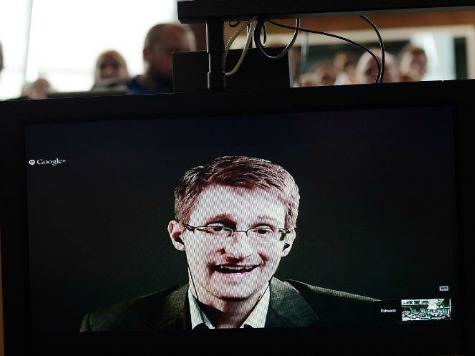President Obama said Sunday that U.S. intelligence underestimated ISIS’s strength on the ground in Syria and Iraq. National-security officials counter that the president has been receiving precise briefings on the rise of the terrorist group for over two years, but Obama ignored the threat. While politicos point fingers, the danger is escalating rapidly as ISIS acts on insight into U.S. vulnerabilities it is getting from Russia.
Chris Inglis, former deputy director of the National Security Agency, stated that ISIS has “clearly” studied leaked classified NSA material to evade U.S. detection of its activities. More than oceans of indecipherable metadata and email correspondence, as it often is portrayed, the treasure trove divulged by former NSA contractor Edward Snowden details U.S. cyber defenses, military operations and proficiencies, codes, partnerships, alliances, cooperative foreign nationals, special-collection capabilities, and domestic defense systems. This intel gives Islamists enhanced capability to bring war to the American homeland.
It is not an accident that the point man for the damaging disclosure of so much Top Secret information enjoys asylum in Russia and that the intelligence is ending up in the hands of Islamic extremists. “It is reasonable to assume that Vladimir Putin is giving information obtained via Snowden to ISIS or al Qaeda so they can damage U.S. infrastructure as his proxy,” former NSA executive Charlie Speight explained to us. “Without getting his hands dirty or spending a single ruble, Putin can bring us down and elevate Russia.”
The Putin-Snowden collaboration makes sense in the context of the Russian leader’s background in the trade-craft of international espionage. A former colonel in the KGB, Putin initially served in counter-intelligence before spending the bulk of his career in the directorate responsible for training and management of covert agents and the collection of political, scientific, and technical intelligence. “It is becoming increasingly apparent that Snowden is actually a Russian agent who went into his NSA contractor job with the instructed intent to steal as much information as possible,” says Speight, a 35-year veteran of the NSA. “The dots connect that he already was a Russian spy before going to work for U.S. intelligence.”
One strategic asset put at greater risk from the Snowden leaks is America’s under-defended electronic infrastructure. In July, John Carlin, assistant attorney general for national security, warned that major cyber attacks are being planned on a 9/11 scale, and that Islamic radicals are a threat on that front in addition to state actors such as China and Russia. “It’s clear that the terrorists want to use cyber-enabled means to cause the maximum amount of destruction to our infrastructure,” he said. “American companies’ most-sensitive patented technologies and intellectual property, U.S. universities’ research and development, and the nation’s defense capabilities and critical infrastructure, are all under cyber attack.”
What Putin gets out of this terror threesome is simple. Without leaving a trace to Moscow, a terrorist proxy could use knowledge divulged by Snowden to take out key functions of the U.S. economy such as the power grid, air-traffic controls, and banking institutions that would catapult a superpower backwards into the Third World with the push of some buttons. Although terrorist organizations are growing in sophistication, it is more likely they could pull off such a blow with the help of a major power whose global status would benefit as a result of U.S. weakness.
All of the dangers facing the West are heightened by operational compromises resulting from Snowden’s espionage. Central to this precarious posture is the neutralization of U.S. intelligence superiority by the sidelining of important combat-support structures such as the NSA. When the next terror attack occurs, the perpetrators’ jobs will be easier because of the ISIS-Putin-Snowden threesome.
Brett M. Decker is consulting director at the White House Writers Group and former senior vice president at the Export-Import Bank. Van D. Hipp Jr. is chairman of American Defense International and a former deputy assistant secretary of mobilization for the Army.

COMMENTS
Please let us know if you're having issues with commenting.